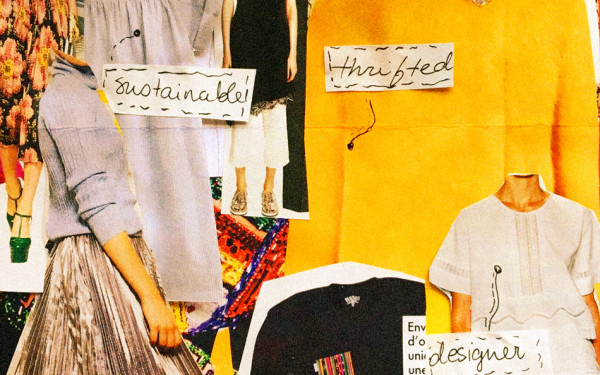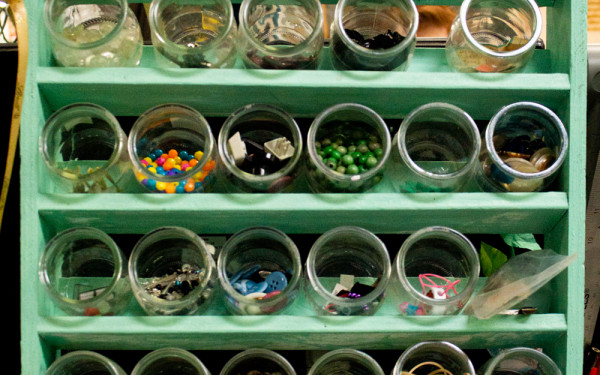Sustainable Fashion Made Affordable
Tessa Battistin Takes Ethical Clothing Into Her Own Hands
“Remember to let her into your heart, then you can start to make it better.”
This article has been updated.
The music of The Beatles oscillates through the air from the record player in a Mile End studio apartment, sinking into the wooden floors.The room smells like ink and cloth. The artist’s hands are strong and sure, movements purposeful and efficient as she presses down on the squeegee. The black goop slides over the screen, thins out into the white t-shirt. The wax of the screen is stained in blackness.
Tessa Battistin, 22, is an entrepreneur, artist, and fashion activist. A fresh McGill graduate, she created the local clothing brand Asset Designs, whose mandate is to make clothing using ethical and sustainable means.
She lifts the screen, and words are scattered onto the right hand pocket of the shirt, reading like a sigh: “Lilac-crusted thoughts follow honey-dipped dreams.”
The material of the shirt is so soft, and for good reason. It does not have the blood and perspiration of overworked and underpaid factory workers. It is ethically sourced from fair wage, fair labour factories abroad.
Battistin’s eyes are a mix of hazel and amber. They’re clear and focused, steady, and dancing with kindness. She sees the world as an artist; everything has the capability to be art, even the most mundane of objects. She molds her experiences and the world around her into visual and literary pieces and prints them on clothing and bags. Her products are “lived art,” she said, “as it interacts with the wearer.”
Battistin was born in Montreal and grew up near New York City, where she had ample access to museums and art galleries as a child. Being immersed in the art world at a young age encouraged her to revere creativity, she said, and make that an important part of her life.
Her organic cotton drawstring bags and cotton lunch bags are made in a factory in Montreal’s Mile-End. The crew neck t-shirts are made in a factory in Scarborough, and the cotton is “cut, knit and dyed on Canadian soil,” reads Asset Design’s website.
Battistin went to Scarborough personally to see what the working conditions of the factory were like.
The pocket tees are from an American-based supplier that uses fair-wage labor factories in Guatemala and Egypt—although she is not stocking those any more. She is in discussions with Canadian fabric companies and factories to make her own line of clothing right here in Montreal.
“I’d rather not import it, if I can avoid it.”
Battistin makes her articles affordable and is as transparent as possible as to where the fabrics come from. Her garments are made with materials that are 100 per cent fair wage and fair labor abroad, or from materials made in Canada.
“There is no perfect method of consumption, because essentially you’re wasting resources no matter what when you’re buying something new. People aren’t going to stop buying new clothes,” she said. Her stance is to educate people on new buying habits, teaching people how to repair garments, and buy things for quality and longevity.
“There is a method to my madness. Otherwise everything would fall apart.” —Tessa Battistin
At 16, she first learned how to silkscreen and fell in love with it. She started making t-shirts for friends for cheap and sold out within minutes.
Silkscreening was still just a hobby when she met her roommate, Charlotte Cailliarec, at McGill University. She had brought all her screens to her McGill dorm room in 2013 where she continued to make articles of clothing for friends of friends.
In the last two years Battistin decided to take her growing business seriously. In 2017 she took part in the Dobson Cup at McGill, an entrepreneurship competition, where she pitched her business Asset Designs to the judges, where she made it to the semifinals.
“She is incredibly driven,” said Cailliarec. Battistin has some of the best time management skills she knows. She will get up early in the morning, sit down and bang out work.
“She is extremely ambitious,” said Caillarec.
Battistin now sells her clothing in three stores, one in Salt Spring Island in B.C. and two in the Mile End, the Art Pop Store and Empire Exchange. The rest is done through online shopping on her website and laboriously at farmers markets, including Concordia’s.
Her studio, which she moved into last September, is the birth space of her new pieces. She personally prints all her products there by hand. Blank t-shirts, bags and pouches are stacked together on the left side of the room on shelves. To the right is another shelf, packed with finished pieces and misprints on the bottom shelf, all neatly folded. Everything is intricately labeled with post-it notes.
“There is a method to my madness,” Battistin said. “Otherwise everything would fall apart.”
Battistin started branding her art pieces and birthday cards she had made with Asset Designs as a young child, almost as a joke at her mother’s suggestion, Asset being her first name, Tessa, spelled backwards. She stuck with it throughout the years, and decided to name her apparel brand after that.
Battistin illustrated all of her designs and wrote all of the poetry that is printed on her apparel.
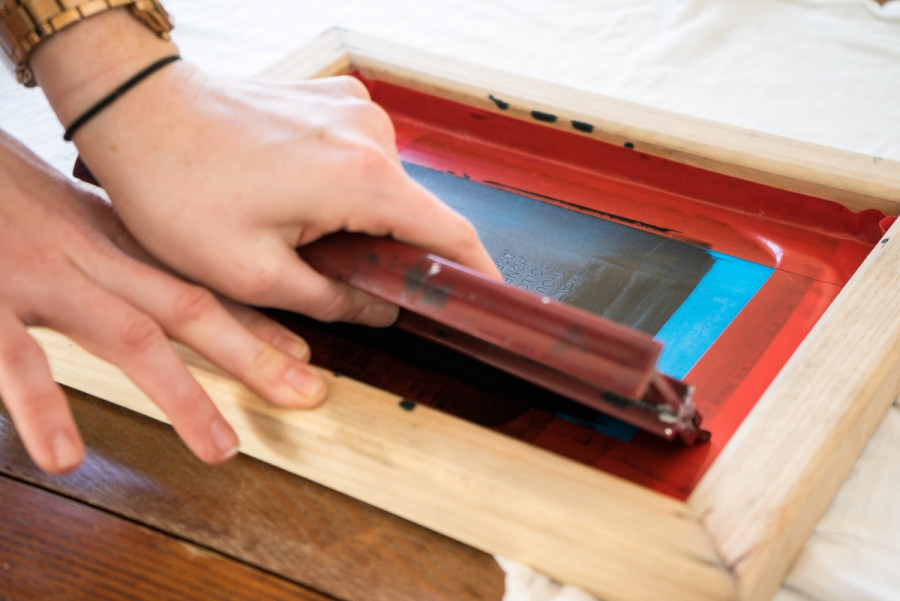

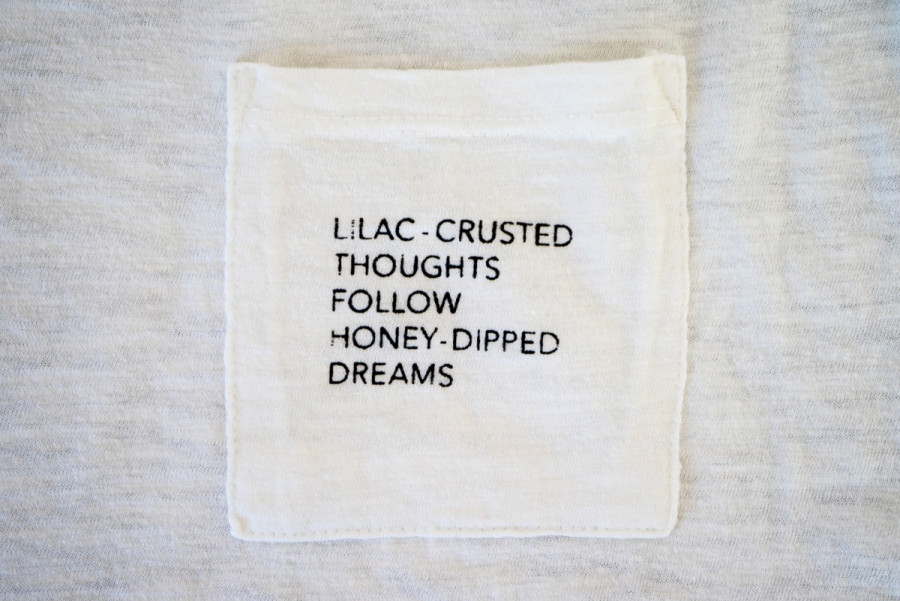
“Asset Designs used to be an outlet for my artistic expression,” Battistin said. “Now it has become a platform for activism, and that is what’s really important to me”.
As Battistin began to make more products, she started asking where the textiles came from, and how they were made. That was when the activism came to the forefront of her brand.
“It’s hard to be in this business and not ask these questions,” she said. “If you’re in the fashion industry and you’re not being an activist about it, it means you’re being silent. You’re not taking it seriously, you’re not taking a stance.”
She sits folded at her desk in a corner of the bright room. A beautiful bay window overlooks the snowy street below, natural light reflecting in her eyes.
“Asset Designs is a way to offer a solution for people who are looking to buy ethically-made, affordable clothing,” said Battistin.
“The problem with this is often ethical clothing is extremely unaffordable,” she continued. “Asset Designs is a way for me to express my art and my poetry, while also offering people something that is affordable.
“I’m someone who likes to eat organic, likes to exercise, and thinks about where my food comes from. Clothing is just another thing we should pay attention to. We put food inside our bodies, but we should also care about what we put on our bodies. We interact with our clothes just as much as we interact with the food that we eat.”
Correction: A previous iteration of this article misstated from where Asset Designs sources its materials. The Link regrets the error.

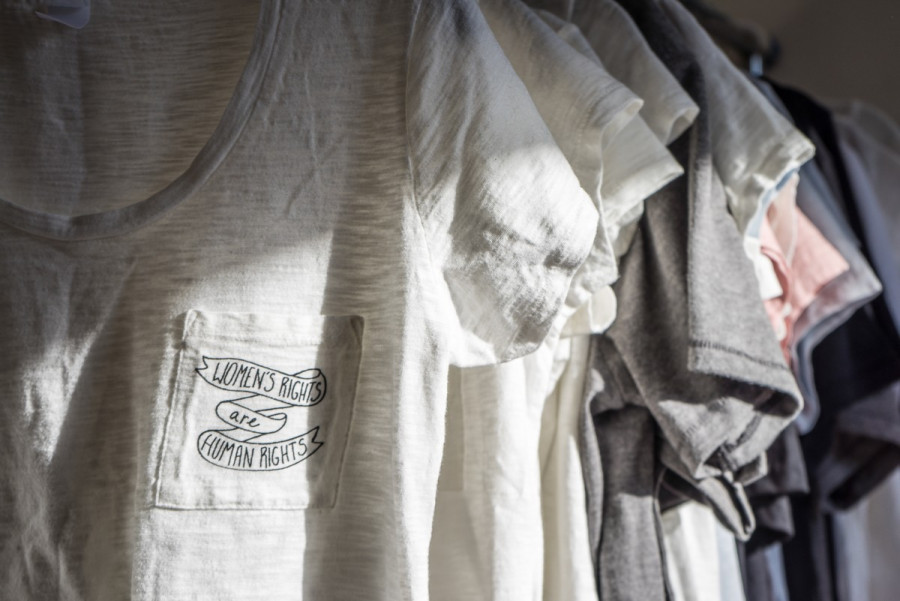
_600_832_s.png)

